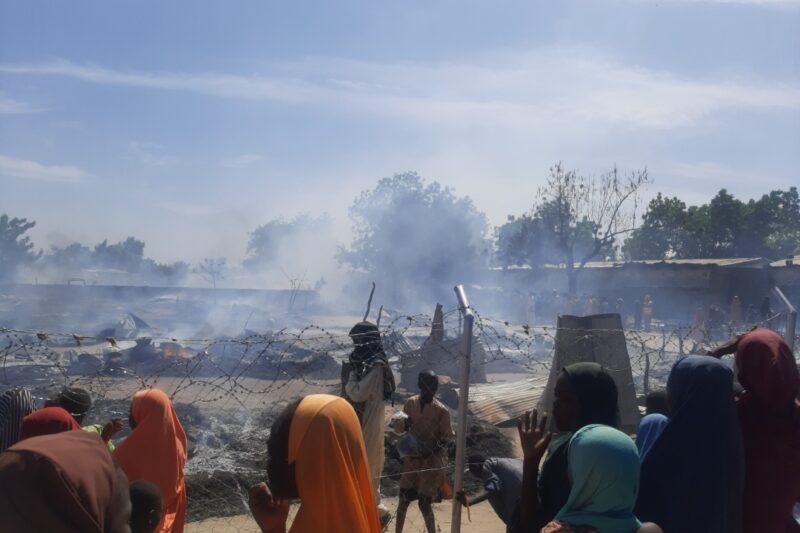Most internally displaced persons at the camp have had to sleep in the open because they have nothing left and no place else to go.
The disastrous fire that broke out at the internally displaced persons’ Muna camp in Maiduguri on November 15 has left thousands homeless and in desperate need of humanitarian aid.
Most of the thatched huts and thousands of tents were destroyed, leaving the victims with nothing except the clothes on their backs.
About 2,000 shelters, mostly tents, and about 1,307 thatch houses were burnt to a cinder.
Two children died in the blaze and a 40-year-old man was badly burnt and rushed to hospital to receive immediate treatment.
Livestock were killed and property worth thousands of naira destroyed.
Falmata Bukar Ali told RNI that she was not home when the fire broke out.
“I had taken my son to hospital. When I returned, my home was no longer a home. Instead, there were just piles of ashes. Then we slept out in the open, despite the harmattan [a cool dry wind that blows from late November to mid-March and picks up fine dust particles, facilitating the spread of wind-borne diseases for thousands of kilometres].
“The place was very cold for us and our kids, there were mosquitoes all over, we didn’t have a mosquito net or any mats. We didn’t sleep well.”
Zainab Ali said: “I don’t want to recall that sad night. It was terrible. It was one of the worst nights of my life. It seemed to last forever. It was extremely uncomfortable. We slept at the camp compound with other families who lost their homes. Our children slept with us – there was a harsh windstorm. The children were crying because they couldn’t sleep at all – and there was not anything we could do to help them. My children kept asking me to give them something to cover themselves, but I did not have anything.”
Falmata Fantami, who lives in Muna camp but whose dwelling was not affected by the fire, told RNI that even though she had not been affected, she was frightened by what she saw.
“The living conditions at the camp are overcrowded. Those of us who were not affected are still afraid another fire could break out at any time. There have been a few fires in the camp. We are extremely cautious when we cook now.
“Camp leaders have laid down strict rules that no one can leave his or her kitchen while they are cooking. They have also put a ban in place that no children are allowed to cook. Cooking time has been fixed from 8am to 9am – after that no one will be allowed to cook until the evening hour. If you violate the rules – especially if a fire breaks out – you will pay a fine of ₦15,000.”
Mustapha Mohammed, a Muna camp secretary, said: “To make sure that another fire does not break out, we have taken measures, with the help of the civilian joint task force (CJTF) security personnel who will keep surveillance on every household, and we asked traditional leaders to urge the camp residents to stick to the rules and take care when they are cooking. We have given strong instructions to all households to abide by the rules.”
Some of the women interviewed by RNI said they had started packing all their valuable belongings. They intend keeping them in relatives’ houses in host communities. Others said they had already started planning to leave the camp because it was too dangerous.
Abdullahi Suleiman, director of operations of the State Emergency Management Agency (SEMA), said: “We are aware of the growing humanitarian needs after the fire at Muna camp. Most of those affected lost everything they owned. We provided some emergency help but that’s not enough. We are working with the Northeast Development Commission, the National Commission for Refugees, Migrants and Internally Displaced Persons and other partners to try to rebuild thatch houses and get other forms of shelter for the affected residents, who also need urgent humanitarian aid. There are thousands of people of Muna camp are in desperate need of aid.”
FALMATA MOHAMMED ALI








